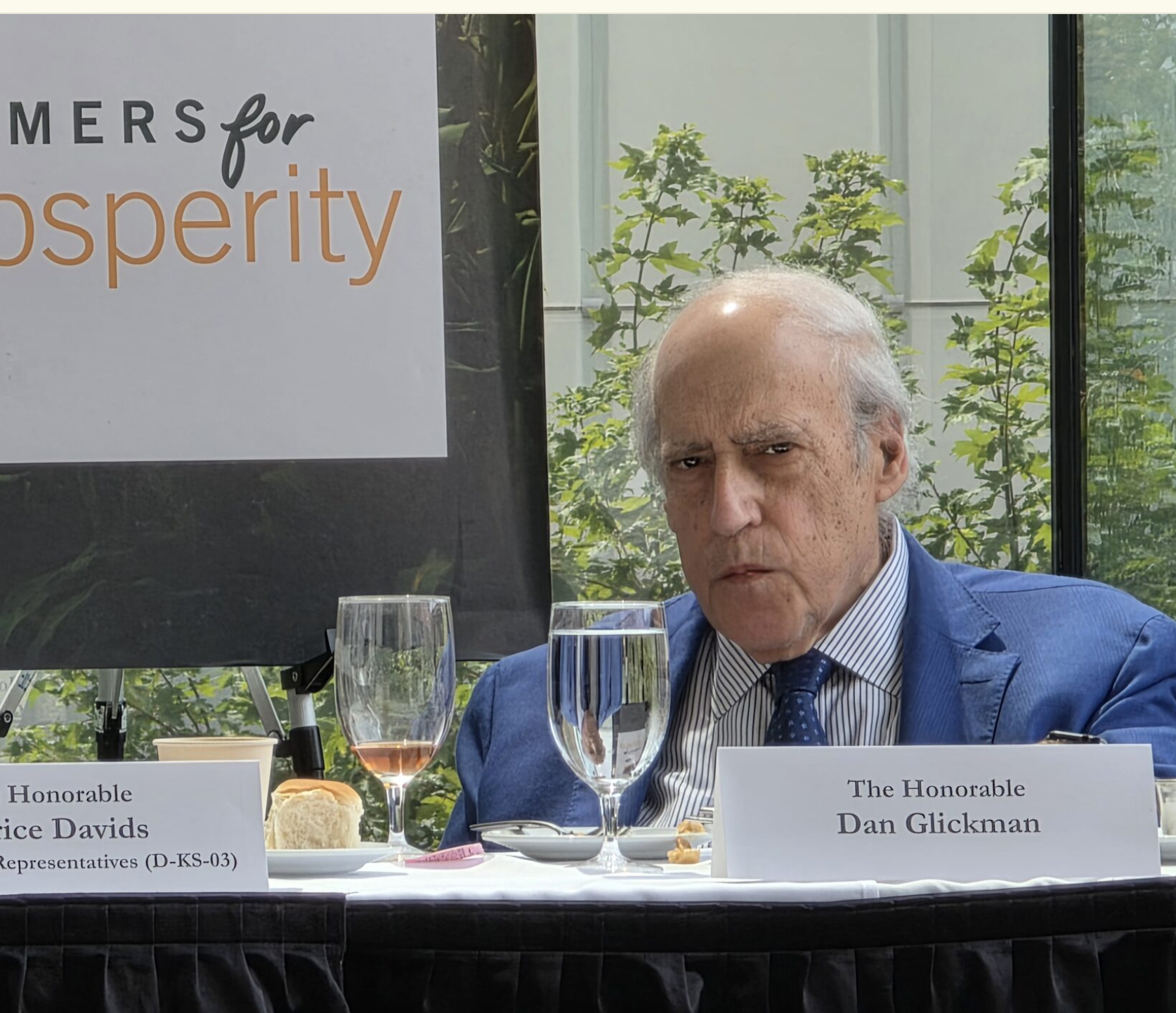
BY MORGAN CHILSON
Kansas Reflector
OVERLAND PARK — Former U.S. Secretary of Agriculture Dan Glickman pushed for deepening relationships and maintaining international growth opportunities for Kansas farmers at a meeting of state political and agricultural leaders Wednesday.
Glickman and U.S. Democratic Rep. Sharice Davids spoke about the effects of tariffs and federal policies on Kansas farmers during a U.S. Global Leadership Coalition luncheon. The event was closed to journalists, but Glickman shared thoughts on the current political climate afterward.
“My theory is pretty much don’t burn bridges, build bridges,” he said. “I got along very well with (Pat) Roberts, (Bob) Dole, (Nancy) Kassebaum. We didn’t try to kill each other.”
Glickman, a Democrat, said Dole, a longtime Republican senator, helped him get the position as secretary of agriculture, which he held from 1995 to 2001 during the Clinton administration.
Politicians need to be able to reach across the aisle and have open discussions and agreements, Glickman said.
“I hope we can create an environment where there’s trust in the system of government generally, because it’s not just agriculture, it’s everything,” he said. “And then we have some predictability in foreign policy, federal farm policy.”
He would also like to see Republicans stand up to the president, something he said he had to do when he served under Clinton.
“I’d like to see the Republicans show more courage and moxie in challenging the president – on the federal side, not so much on the Kansas side – when they think he’s wrong,” Glickman said. “It’s difficult to challenge a president if you’re in their party. When I would say to Clinton, ‘I think you’re wrong,’ I would do it very deliberately but still, I would do it at times, and I don’t see very much happening like that.”
National reports that legislators fear retaliation if they speak up aren’t good, Glickman said.
“I don’t think it’s healthy for democracy. You know, you’ve got to be able to speak out responsibly,” he said.
International trade
Building relationships extends beyond domestic politics, and Glickman is concerned international relationships may be impaired because of the way tariffs are being negotiated. He’s not against tariffs in general, he said, but he’s concerned about future trade effects.
“I’ve never been a purist on tariffs and trade,” he said. “I mean, there are some countries that abuse their relationships with us, and that’s why you have tariff agreements and trade agreements, to build those things in there so one country can’t take advantage of another by being too self protective.”
But Glickman said the way trade barriers are being implemented concerns him. Historically, international policies involved collaboration between Congress and the private sector to determine the best way to proceed, he said.
“Because when you put your finger on one set of problems, if you’re not careful, you’re going to create another set of problems,” Glickman said. “Agriculture has often been the whipping boy for those other sets of problems, because of how much we rely on access to global markets. So I guess my real answer is, can we do this carefully, or do we have to do it with a sledgehammer?”
Right now, the country is relying too much on the sledgehammer, Glickman said.
Growth opportunities in agriculture lie in the international market, he said.
“The president said something when he announced the original set of tariffs – ‘American farmers are going to love this, because they can finally take advantage of domestic markets,’ and I’m thinking to myself, no, that’s not where the growth is,” Glickman said. “There’s not really much growth in domestic markets. There might be a little here, a little there. All the growth is global, and so maybe he doesn’t understand it.”
Nick Levendofsky, executive director of the Kansas Farmers Union, attended the luncheon and agreed with Glickman.
“As Secretary Glickman mentioned, we are becoming less and less of a reliable trading partner to the world,” he said. “Anymore, we are a global market, and you know, you can be upset with another country because maybe they don’t do as much trade with you and all that, but I’ve always believed that the carrot versus the stick does a lot more good.”
Levendofsky said the potential of growing markets such as India are important to Kansas farmers.
“If China is shutting the door on us, we’ve got to find an opening somewhere,” he said. “And that, to me, right now speaks to India.”
Farm Bill
Along with international trade, Glickman is watching the future of the Farm Bill. The reconciliation bill passed by Congress in July addressed some policies usually found in the Farm Bill, but it didn’t include all the elements that need to be addressed, he said.
A Farm Bill has not passed this year, and Glickman said expert assessments that this may be the beginning of creating a different process for agricultural legislation is “astute.”
“We’ve had in the last 40 or 50 years, these five-year farm bills,” he said. “But then lately, we’ve been having these extensions every year and with no real fundamental change.”
Recent legislation added $40 to $50 billion of new or enhanced programs over the next 10 years, and also addressed commodity programs, crop insurance and risk management, Glickman said.
He hopes this won’t be the new normal because there were many subjcts not addressed, such as research and nutrition programs.
In his role as a senior fellow at the Bipartisan Policy Center and the Council on American Politics at George Washington University, Glickman said he keeps in contact with concerns of farmers and trade groups.
The real worry right now is instability, he said.
“The big story in agriculture is lack of stability, lack of planning, lack of predictability,” Glickman said. “Agriculture is complicated, and then the volatile weather complicates it further. Changes in the weather, plant and animal disease, making sure our research budgets are adequately funded – that’s all part of a new Farm Bill.”




